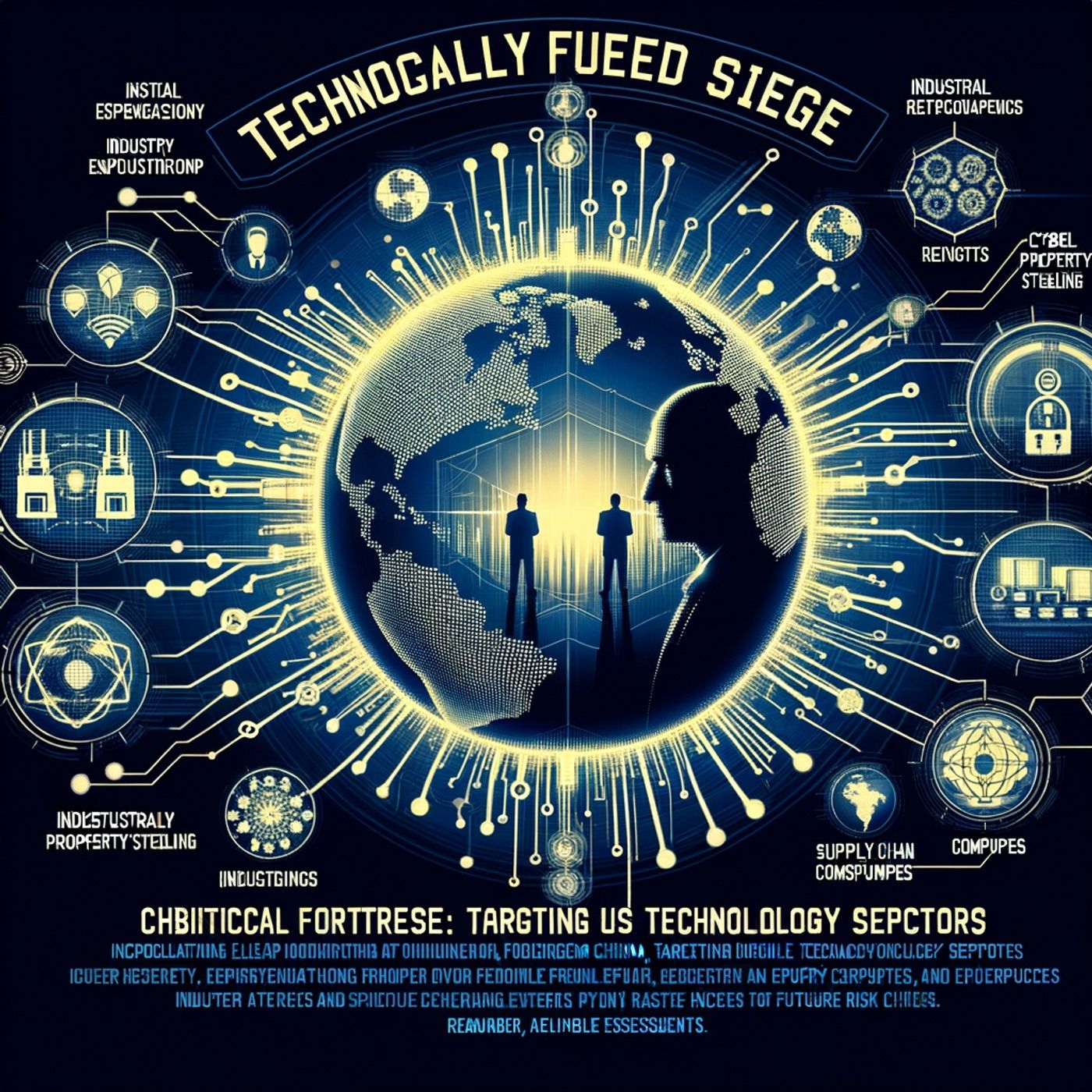Silicon Siege: China's Tech Offensive

Silicon Siege: China's Tech Offensive
Podcast Description
This is your Silicon Siege: China's Tech Offensive podcast.Silicon Siege: China's Tech Offensive is your go-to podcast for the latest updates on Chinese cyber operations targeting US technology sectors. Tune in regularly for in-depth analysis of the past two weeks' most significant events, including industrial espionage attempts, intellectual property threats, and supply chain compromises. Gain valuable insights from industry experts as we explore the strategic implications of these cyber activities and assess future risks to the tech industry. Stay informed and prepared with Silicon Siege.For more info go to https://www.quietplease.aiCheck out these deals https://amzn.to/48MZPjs
Podcast Insights
Content Themes
The podcast focuses on industrial espionage, intellectual property theft, and supply chain vulnerabilities. Episodes analyze notable events, including China's antitrust probes, the use of espionage techniques at US ports, and significant cyber incidents such as hacking attempts against semiconductor firms. It emphasizes the strategic implications of these actions for US national security and global technology competitiveness.

This is your Silicon Siege: China’s Tech Offensive podcast.
Silicon Siege: China’s Tech Offensive is your go-to podcast for the latest updates on Chinese cyber operations targeting US technology sectors. Tune in regularly for in-depth analysis of the past two weeks’ most significant events, including industrial espionage attempts, intellectual property threats, and supply chain compromises. Gain valuable insights from industry experts as we explore the strategic implications of these cyber activities and assess future risks to the tech industry. Stay informed and prepared with Silicon Siege.
For more info go to
Check out these deals https://amzn.to/48MZPjs
This is your Silicon Siege: China’s Tech Offensive podcast.
Hey listeners, I’m Ting, and tonight’s episode is Silicon Siege: China’s Tech Offensive, live from the last two weeks of mayhem on your chips, clouds, and cables.
Let’s start where your favorite SaaS lives: the hypervisor layer. The Register reports that researchers at Huntress uncovered a China-linked toolkit that had been exploiting VMware ESXi zero‑days like CVE-2025-22224 a full year before VMware disclosed them, using a SonicWall VPN compromise to pivot from guest VMs straight into the ESXi hypervisor. That is industrial espionage gold: if you own ESXi, you quietly see whatever a cloud-hosted R&D lab, AI startup, or defense contractor runs there, from chip design simulations to proprietary models.
Now zoom from clouds to Congress. Fortune, citing Financial Times, says the Chinese state-backed group Salt Typhoon slipped into email systems for staff on the House Foreign Affairs, Intelligence, Armed Services, and China committees. That is not just spying on government gossip; those mailboxes map export controls, semiconductor policy, and funding for critical tech. If you’re planning IP theft against Silicon Valley, advance intelligence on which sectors will face new restrictions is a strategic cheat code.
According to Government Executive, investigators believe these intrusions are part of a long-running Chinese effort to hit U.S. government communications, echoing earlier compromises of the Congressional Budget Office and the Congressional Research Service. Policy intel today, targeting blueprints tomorrow.
Slide down to the supply chain. The National Law Review highlights how U.S. state attorneys general are suddenly treating Chinese hardware and consumer tech as potential collection platforms. Texas Attorney General Ken Paxton sued smart TV makers Hisense and TCL, arguing that their Chinese ties plus China’s National Security Law effectively give Beijing a backdoor into U.S. viewing data. Florida’s attorney general subpoenaed TP-Link over supply chain and data handling, while Arizona sued Temu for aggressive data collection. None of this is a zero‑day splashy hack; it’s a slow, legal realization that your cheapest gadget might be the stealthiest exfiltration node in the room.
On the infrastructure side, outlets like AOL News quote grid-security experts warning that Chinese-made electronics embedded in U.S. power systems could be remotely exploited, turning routine equipment into a latent kill switch. That’s Volt Typhoon’s critical‑infrastructure playbook moving from theory to procurement reality.
Industry folks are not calm. Cybersecurity Dive notes that CISA’s own experts warn China’s growing aggression, plus a potential Taiwan conflict, means U.S. ports, rail, and energy networks are now priority targets, while CISA itself is under-resourced and scrambling to keep up. Meanwhile, analyst Maggie Gray points out that Chinese operators are starting to lean on AI‑driven offensive tooling, automating reconnaissance and exploit chaining across massive attack surfaces.
So, future risk? Expect more ESXi-style deep stack compromises, more quiet pressure on vendors whose hardware sits in data centers and substations, and more espionage aimed at the policy levers that shape U.S. tech.
Thanks for tuning in, listeners, and don’t forget to subscribe. This has been a quiet please production, for more check out quiet please dot ai.
For more http://www.quietplease.ai
Get the best deals https://amzn.to/3ODvOta
This content was created in partnership and with the help of Artificial Intelligence AI

Disclaimer
This podcast’s information is provided for general reference and was obtained from publicly accessible sources. The Podcast Collaborative neither produces nor verifies the content, accuracy, or suitability of this podcast. Views and opinions belong solely to the podcast creators and guests.
For a complete disclaimer, please see our Full Disclaimer on the archive page. The Podcast Collaborative bears no responsibility for the podcast’s themes, language, or overall content. Listener discretion is advised. Read our Terms of Use and Privacy Policy for more details.